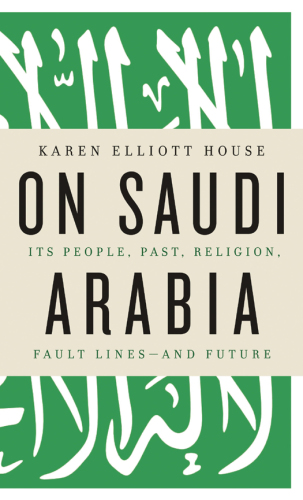
On Saudi Arabia
Its People, Past, Religion, Fault Lines--and Future
کتاب های مرتبط
- اطلاعات
- نقد و بررسی
- دیدگاه کاربران
نقد و بررسی

June 25, 2012
Famed for their “passivity” and “unquestioning acceptance of rules laid down by elders” as well as their fundamentalist, uncompromising outlook, the Saudis are intensely proud, but by and large, have no say in the functioning of their country. The internal contradictions of a medieval theocracy in thrall to modern-day petrocapitalism give Pulitzer Prize–winning journalist House ample material as she interviews princes and terrorists, millionaire playboys and destitute widows, muftis and engineers. Being a foreign woman, she has entrée into both male and female spheres, and the chapter on women is among the most illuminating; though the “overwhelming majority of women are totally subjugated by religion, tradition, and family,” “activist women... can be found scattered across Saudi society.” Chapters on disenfranchised youth, the sclerotic education system, the opaque succession procedures of the ruling dynasty, and the kingdom’s foreign policy each suggest ways in which the country’s potential is being stymied by fear of change, and identify points of conflict that could presage wider unrest. While cogently written, this slim volume is also repetitive and superficial. The same details recur throughout, and the reader emerges with only a basic understanding of the all-important relationship between the religious and political authorities, or of the mechanics of an economy in which 90% of private-sector workers are foreigners. Agent: Janklow & Nesbit.

September 15, 2012
Former Wall Street Journal reporter and publisher House delivers a well-researched, informative book about Saudi Arabian society and where she believes it is headed. The author interviewed a wide variety of Saudi Arabians, including rich and poor, Muslim fundamentalist and modern. Among the subjects is a devout Muslim woman who hosted House for several days in hopes of converting her to Islam. House was not allowed to speak to the woman's husband and was covered from head to toe the one time she was in close quarters with him. On the other end of the spectrum, a young Saudi Arabian female journalist runs an all-girls soccer team, goes to private beaches and has dinner with male friends. She leads a life resembling that of any young woman in the West. House also interviewed reformed terrorists whom the Saudi Arabian government provided with jobs and homes in exchange for repenting. She follows developments in women's rights, such as efforts to change the court system, which favors males. House succeeds in capturing the diversity of Saudi society, painting a more complex picture than the caricature of oil wells and extreme wealth, but a smug authorial tone occasionally creeps in. She references the "passivity" of Saudi people in relation to their government, as if overthrowing a dictator who has no qualms about cutting off people's limbs is an easy task. House claims that the country demonstrates Marx's statement about religion being the opium of the masses, a contention that disregards how a ruthless religious dictatorship can enforce religious practices. Fortunately, for most of the book, House sticks to the facts. Good reading for readers interested in learning about the Saudi Arabia that lies beyond the image of a wealthy country with unlimited money from oil, but some of the author's opinions should be taken with a grain of salt.
COPYRIGHT(2012) Kirkus Reviews, ALL RIGHTS RESERVED.

April 15, 2012
Pulitzer Prize-winning reporter and then foreign editor of the Wall Street Journal, House has been familiarizing herself with Saudi Arabia over 30 years. Here she draws on her access to the ruling Al Saud family to paint a portrait of a country central to Middle East politics and America's future--it's our second largest oil supplier. With a 40,000-copy first printing.
Copyright 2012 Library Journal, LLC Used with permission.

September 1, 2012
Saudi Arabia, ruled by the royal Al Saud family, provides one of every four barrels of oil exported around the world. It is a little-understood nation of inordinate importance to the rest of the globe. As the Arab Spring has transformed other oil-producing nations in the Middle East, forcing developed nations to consider democratic ideals versus oil economies, Saudi Arabia has so far managed to stay outside that debate despite its repressive regime. House, Pulitzer Prizewinning reporter and former Wall Street Journal correspondent, spent five years traveling the kingdom to study a society she calls Islam Inc., owned and operated by the Al Saud royal family for generations. By exploiting deep religious, tribal, and regional differences for hundreds of years, the Sauds rely on an Islam that demands obedience of men, who demand obedience of women, and allows for no questioning of authority, despite widespread poverty, unemployment, and roiling discontent. House explores the history and fragility of the royal family and the interplay of religion, economics, and culture as well as the forces of modernity, including the Internet, that promise transformation.(Reprinted with permission of Booklist, copyright 2012, American Library Association.)

























دیدگاه کاربران